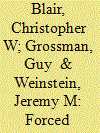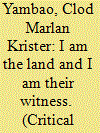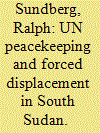|
|
|
Sort Order |
|
|
|
Items / Page
|
|
|
|
|
|
|
| Srl | Item |
| 1 |
ID:
110183


|
|
|
|
|
| Publication |
2012.
|
| Summary/Abstract |
Anecdotal evidence suggests that, in stateless regions in Colombia, the establishment of oil palm 1
plantations generates more forced migration than the introduction of coca crops. We provide a theoretical model to study this phenomenon where an agent, allied with the illegal armed group that controls a region, chooses between buying an agricultural good from peasants or producing it himself by evicting farmers from their lands. We compare two crops that differ in their labor intensity. Results indicate that it is more likely that the agent finds it optimal to displace peasants in the case of the less labor intensive crop.
|
|
|
|
|
|
|
|
|
|
|
|
|
|
|
|
| 2 |
ID:
186189


|
|
|
|
|
| Summary/Abstract |
Little theoretical or empirical work examines migration policy in the developing world. We develop and test a theory that distinguishes the drivers of policy reform and factors influencing the direction of reform. We introduce an original data set of de jure asylum and refugee policies covering more than ninety developing countries that are presently excluded from existing indices of migration policy. Examining descriptive trends in the data, we find that unlike in the global North, forced displacement policies in the global South have become more liberal over time. Empirically, we test the determinants of asylum policymaking, bolstering our quantitative results with qualitative evidence from interviews in Uganda. A number of key findings emerge. Intense, proximate civil wars are the primary impetus for asylum policy change in the global South. Liberalizing changes are made by regimes led by political elites whose ethnic kin confront discrimination or violence in neighboring countries. There is no generalizable evidence that developing countries liberalize asylum policy in exchange for economic assistance from Western actors. Distinct frameworks are needed to understand migration policymaking in developing versus developed countries.
|
|
|
|
|
|
|
|
|
|
|
|
|
|
|
|
| 3 |
ID:
157833


|
|
|
|
|
| Summary/Abstract |
We use a unique data-set gathered during a short-lived interwar period in the Nuba Mountains of Sudan to compare characteristics of the households returning after the conflict with those that stayed in their communities of origin. We found that returning households seemed to face worse economic conditions, particularly in the case of female-headed returnee households. Nevertheless, our results show that returnees tend to perform better on different health indicators. Using a detailed set of variables about hygiene and sanitary habits, we explore the hypothesis that the latter result may be related to changes in attitudes given the distinct experiences during displacement. We show that returnees are indeed more likely to adopt these measures.
|
|
|
|
|
|
|
|
|
|
|
|
|
|
|
|
| 4 |
ID:
185934


|
|
|
|
|
| Summary/Abstract |
What happens to place-based, intergenerational knowledge in conditions of displacement? Here we attempt an answer to this question by reflecting on the experiences of the Indigenous peoples of Mindanao in the southern Philippines, collectively known as Lumads. For decades, Lumad communities have faced violence and displacement at the hands of the Philippine military, corporate armies, civilian militias, and rebel groups. Most accounts of Lumads portray them as passive victims who are “caught in between” warring factions of capitalists and leftists. This paper aims to augment a small but growing body of work that challenges such accounts and centers the historical agency of Lumads. In particular, we highlight some of the ways in which Lumads make life, place, and memory in the schools and community centers that they have established at three sites in Mindanao and Manila. In becoming Lumad places, these are sites in which Lumads of different ages, ethnicities, and social standings actively remake their relations with themselves, with their surroundings, and with others; they are sites of intergenerational communication and consternation; they are sites of pan-ethnic identity formation and solidarity; and they are sites of despair, repair, and potentially transformation.
|
|
|
|
|
|
|
|
|
|
|
|
|
|
|
|
| 5 |
ID:
168796


|
|
|
|
|
| Summary/Abstract |
How does forced migration affect the politics of host states and, in particular, how does it impact states’ foreign policy decision-making? The relevant literature on refugee politics has yet to fully explore how forced migration affects host states’ behavior. One possibility is that they will employ their position in order to extract revenue from other state or nonstate actors for maintaining refugee groups within their borders. This article explores the workings of these refugee rentier states, namely states seeking to leverage their position as host states of displaced communities for material gain. It focuses on the Syrian refugee crisis, examining the foreign policy responses of three major host states—Jordan, Lebanon, and Turkey. While all three engaged in post-2011 refugee rent-seeking behavior, Jordan and Lebanon deployed a back-scratching strategy based on bargains, while Turkey deployed a blackmailing strategy based on threats. Drawing upon primary sources in English and Arabic, the article inductively examines the choice of strategy and argues that it depended on the size of the host state's refugee community and domestic elites’ perception of their geostrategic importance vis-à-vis the target. The article concludes with a discussion of these findings’ significance for understanding the international dimension of the Syrian refugee crisis and argues that they also pave the way for future research on the effects of forced displacement on host states’ political development.
|
|
|
|
|
|
|
|
|
|
|
|
|
|
|
|
| 6 |
ID:
172162


|
|
|
|
|
| Summary/Abstract |
Does UN peacekeeping reduce the number of people forcibly displaced by violence? While previous research has found that the presence and size of peacekeeping deployments can reduce violence, little is known about how peacekeepers affect other aspects of civilian protection. Using original data on sub-national events of forced displacement and the location and size of UN troop deployments this study systematically evaluates the criticized efforts of UNMISS in South Sudan, while simultaneously testing hypotheses on peacekeepers and forced displacement. It is hypothesized that increasing numbers of troops affect the flight equation among civilians through the promise of and actual deterrence of violence. These deterrence-based hypotheses are also discussed in relation to the South Sudan context, creating scope conditions for their possible application in this case. The statistical analysis provides, however, no robust evidence for peacekeepers reducing the occurrence or levels of forced displacement, and only weak evidence of displaced congregating in larger numbers around peacekeeping locations. The paper ends by arguing that the theoretical argument provided may still be valid, but that an effect was not feasible to identify in South Sudan where the peacekeeping mission – despite its comparatively large numbers – lacks credible deterrent capacity.
|
|
|
|
|
|
|
|
|
|
|
|
|
|
|
|
| 7 |
ID:
171162


|
|
|
|
|
| Summary/Abstract |
Building “resilience” to insecurity and crisis is high on the European Union (EU) agenda. EU uptake of this buzzword is especially significant with regard to migration and forced displacement. Uncertainty, however, remains about what resilience is, how it translates into practice, and what its implications are. In this article, we analyze EU humanitarian and development policies and provide empirical insight into resilience-building in Jordan and Lebanon. We show that EU resilience thinking highlights strengthening the humanitarian-development nexus, responsibilizing crisis-affected states, and framing refugees as an economic development opportunity for refugee-hosting states. We also find that how resilience translates into practice depends on the local context and interests of the actors involved. For the EU, resilience-building is primarily a refugee containment strategy that could jeopardize the stability of refugee-hosting states. We conclude that resilience-building in Jordan and Lebanon may ultimately threaten rather than safeguard the security of Europe.
|
|
|
|
|
|
|
|
|
|
|
|
|
|
|
|
|
|
|
|
|